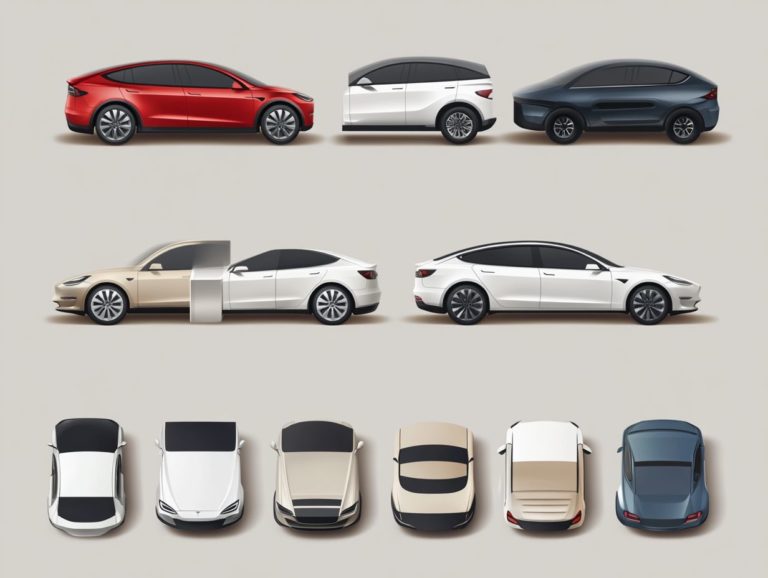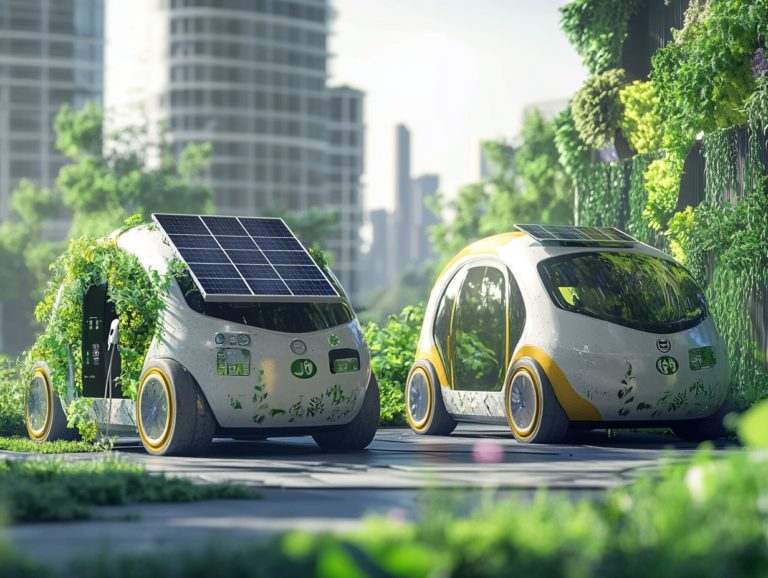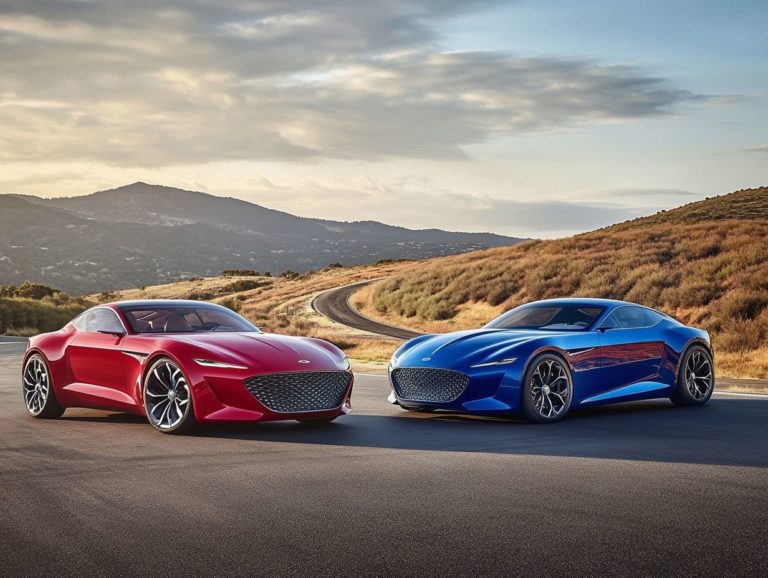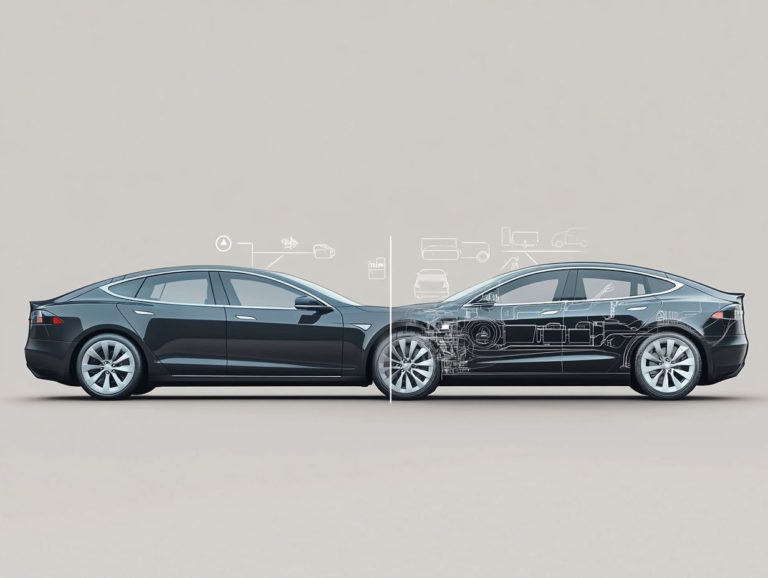Feature Analysis: Gasoline vs. Electric Engines
As the automotive landscape continues to evolve, grasping the distinctions between fuel types and engine technologies is crucial for today s discerning consumers.
This article provides an in-depth comparison of gasoline and electric engines, highlighting essential factors such as performance, environmental impact, cost, maintenance, and availability.
By delving into fuel efficiency and power output, analyzing emissions and carbon footprints, and evaluating long-term expenses and maintenance requirements, you will acquire valuable insights that can guide your decisions in this ever-changing market.
Contents
- Key Takeaways:
- Performance Comparison
- Environmental Impact
- Cost Analysis
- Maintenance and Durability
- Availability and Accessibility
- Frequently Asked Questions
- What are the main differences between gasoline and electric engines?
- Which type of engine is more efficient?
- What are the environmental impacts of using gasoline vs. electric engines?
- Which type of engine is more cost-effective?
- What are the main features of gasoline engines?
- What are the main features of electric engines?
Key Takeaways:
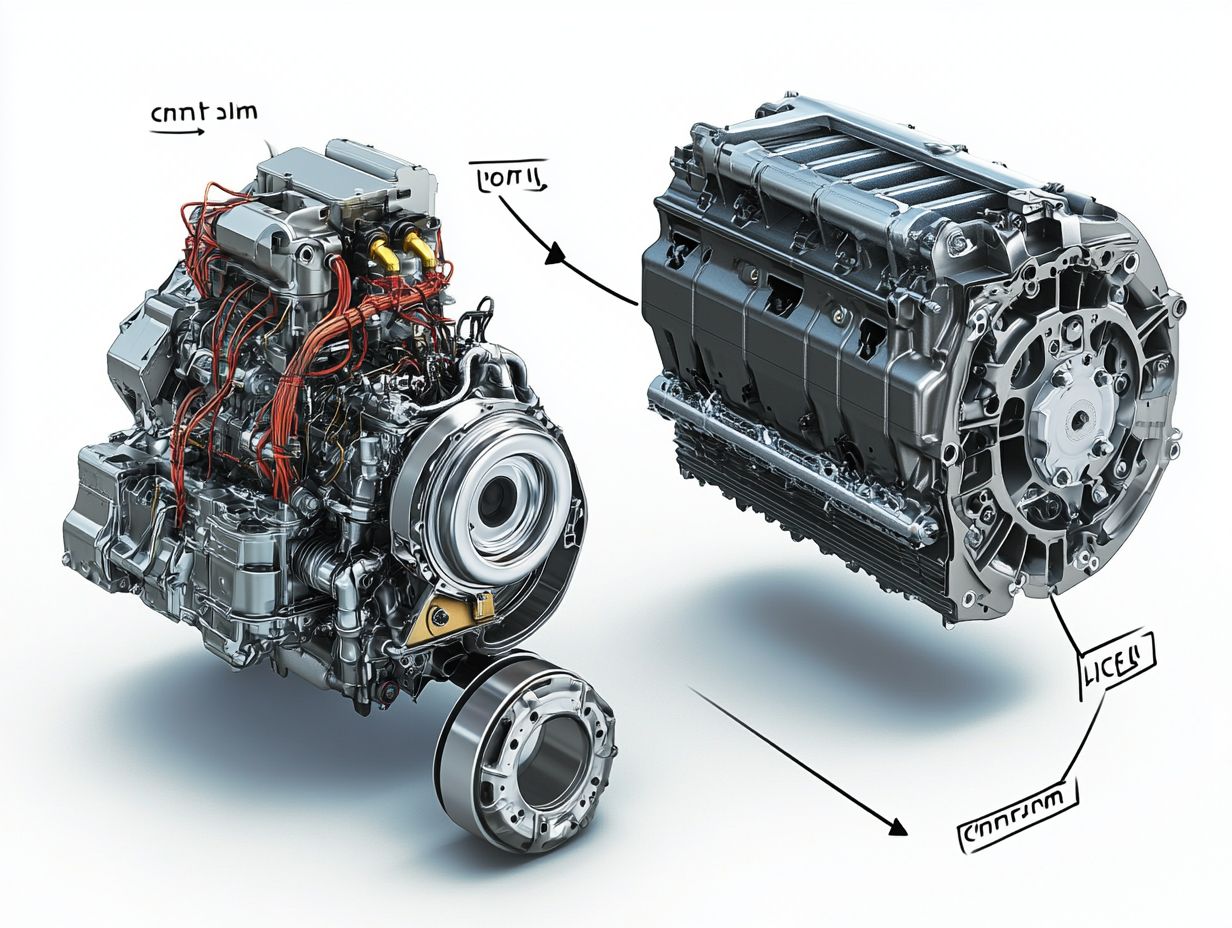
- Gasoline engines offer better performance in terms of power output, while electric engines are more fuel efficient.
- Electric engines have a lower environmental impact with zero emissions, making them a more eco-friendly option.
- While the initial investment for an electric engine may be higher, the long-term expenses for fuel and maintenance are significantly lower compared to gasoline engines.
Overview of Fuel Types and Engine Types
The automotive industry is undergoing a remarkable transformation. Electric vehicles (EVs) are emerging as a robust alternative to traditional gasoline-powered cars.
As you become increasingly aware of the environmental implications, the distinctions between electric and gas cars become clearer. This is particularly true in terms of performance, fuel efficiency, and the overall driving experience.
Hybrid vehicles are also carving out their niche, bridging the gap between conventional internal combustion engines and their electric counterparts. This shift reshapes your preferences across the electric vehicle market.
This transformation invites you to explore the environmental benefits and the diverse performance metrics that set these vehicles apart. Electric cars typically deliver immediate power and a quieter ride, appealing to those who value smooth acceleration and a peaceful driving experience.
Conversely, gas cars are often associated with long-range capabilities and faster refueling times, catering to drivers who appreciate the convenience of gasoline.
Hybrid vehicles strike a balance, effectively leveraging both fuel types to enhance efficiency.
Performance Comparison
Diving into a performance comparison between electric vehicles and gas cars reveals striking differences in speed, acceleration, and the overall driving experience. These factors should weigh heavily on your decision as a potential buyer.
Take the Tesla Model S, for example; it excels in delivering immediate power, leaving traditional gas cars like the Toyota Camry in the dust when it comes to speed. This car offers a distinctive driving experience designed specifically for those who are eco-conscious.
Fuel Efficiency and Power Output
Fuel efficiency and power output are pivotal factors that set electric cars apart from traditional gas vehicles. These factors significantly shape your decisions in the automotive market.
Electric vehicles typically boast higher energy efficiency and lower fuel consumption. This leads to substantial savings over time compared to their gasoline-powered counterparts.
In a world increasingly focused on environmental issues, fuel efficiency and power output are more crucial than ever! Electric vehicles are changing the game by converting a larger percentage of stored energy into forward motion, often delivering impressive torque right from a standstill.
This results in an exhilarating driving experience while dramatically reducing your fuel expenses.
As energy prices fluctuate, you’ll likely find greater predictability in your fuel costs with electric cars, in stark contrast to the often volatile prices of gasoline. Over the lifespan of your vehicle, these savings build up. Electric options are not only environmentally responsible but also a savvy financial choice.
Don t miss out on the future of driving. Explore electric vehicles today!
Environmental Impact
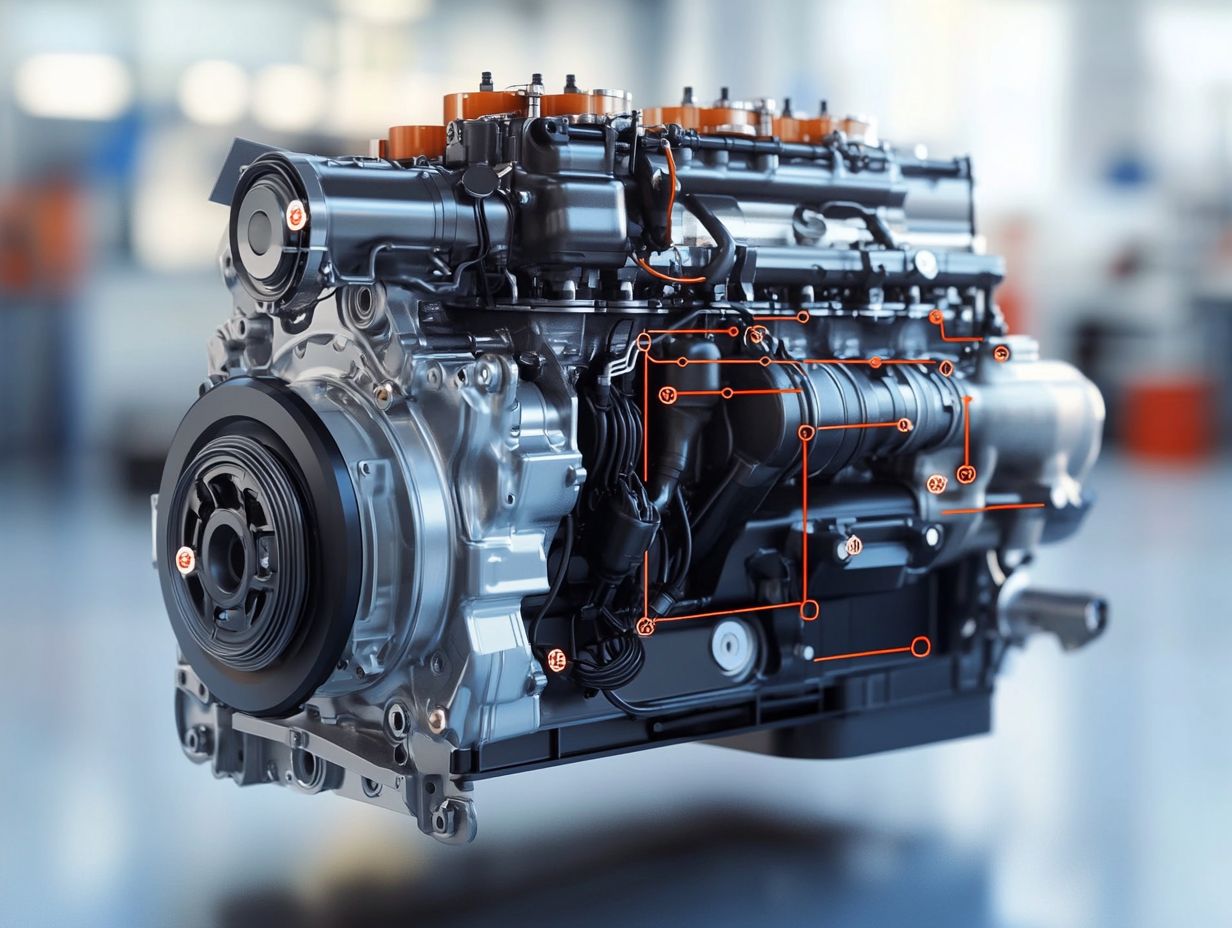
The environmental impact of different vehicle types should be an important factor for you as a consumer. With stricter pollution rules and heightened concerns about carbon footprints, it s essential to stay informed.
Electric vehicles (EVs) present significant advantages in reducing pollution compared to gas-powered cars. They are an increasingly appealing option for eco-conscious individuals eager to minimize their environmental impact.
Emissions and Carbon Footprint
In terms of emissions and carbon footprints, electric vehicles stand out as the clear frontrunners compared to gas cars. They have a remarkable ability to lessen environmental impact.
Transitioning to EVs not only helps reduce greenhouse gas emissions but also enhances air quality in urban areas burdened by pollution. Research shows that electric vehicles can generate up to 60% fewer emissions over their lifespan compared to traditional gasoline-powered vehicles.
This means less pollution, which is a win for everyone. The impressive reduction arises from their zero tailpipe emissions and the potential to utilize renewable energy sources, like solar or wind energy, for charging.
By embracing electric vehicles, you contribute to decreasing urban smog and alleviating health issues related to air pollution. This yields both immediate and long-term benefits for your community.
As more individuals and businesses adopt sustainable practices, the collective reduction in carbon footprints could lead to a significant positive shift in achieving climate goals and fostering healthier living environments.
Cost Analysis
Conducting a thorough cost analysis of electric cars compared to gas vehicles unveils essential insights into both the initial purchase price and the long-term expenses you need to consider.
- Higher upfront cost, but…
- Government incentives
- Lower fuel expenses
- Reduced maintenance
These factors can lead to substantial savings in the long run especially for those who prioritize sustainability.
Initial Investment and Long-Term Expenses
The initial investment for electric vehicles may seem steeper than that of traditional gas cars. However, when you consider long-term expenses, your perspective can change.
Factors like maintenance costs, government incentives, and fuel efficiencies are crucial in calculating the total cost of ownership, making EVs increasingly attractive for budget-conscious individuals.
While the upfront cost might give you pause, the lower maintenance needs of electric vehicles can significantly slash your expenses over the car’s lifetime. With generally fewer moving parts, electric models mean less wear and tear, resulting in fewer mechanic visits. Various government incentives, such as tax credits and rebates, can help cushion that initial investment.
As time goes by, the savings on fuel and maintenance really start to accumulate. Many re-evaluate their hesitations about switching from gas to electric especially as charging infrastructure continues to improve.
Maintenance and Durability
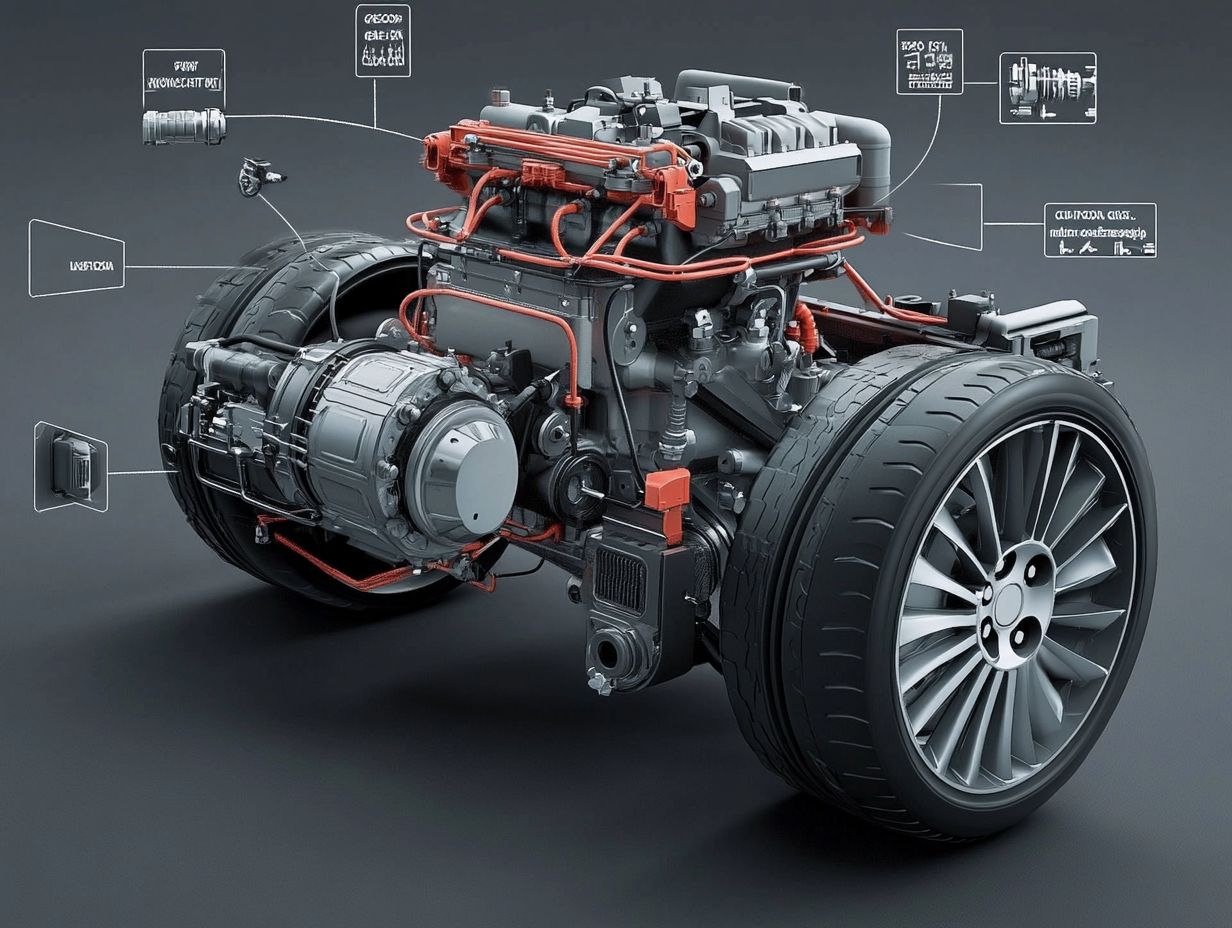
Maintenance and durability play a pivotal role in determining the long-term viability of vehicles, especially when you compare EVs to their gasoline counterparts.
Electric vehicles generally have fewer moving parts, leading to reduced maintenance costs and enhanced reliability. This advantage can significantly extend their lifespan compared to traditional gas-powered vehicles, which often come with a host of maintenance challenges.
By switching to an EV now, you can help improve air quality! Consider making the change for a healthier planet and wallet.
Comparison of Maintenance Requirements and Lifespan
The comparison of maintenance requirements and lifespan reveals significant advantages of electric cars over gas-powered vehicles, particularly when it comes to reliability. With fewer mechanical components and a simple design, electric vehicles typically demand less frequent maintenance, offering a longer lifespan and making them a smart choice for your wallet!
This simple design also slashes repair costs and minimizes your downtime. You can avoid the hassle of frequent service appointments that often accompany gas vehicles. As electric vehicles evolve with advancements in battery technology, their reliability continues to improve, making them an increasingly attractive choice for both eco-conscious consumers and everyday commuters.
With lower energy consumption and fewer moving parts, it s clear that embracing electric options aligns with a more sustainable and hassle-free driving experience. This highlights a crucial factor in the growing preference for electric cars in today s automotive landscape.
Availability and Accessibility
The availability and accessibility of charging stations for electric vehicles are crucial for their widespread adoption, especially compared to the well-established fueling infrastructure for gasoline vehicles.
As the electric vehicle market expands, the demand for a robust network of charging stations becomes vital. This boosts consumer confidence and adoption rates in the rapidly changing automotive landscape.
Availability of Fuel and Charging Stations
The availability of fuel for gas cars and charging stations for electric vehicles significantly influences your choices and adoption behavior. While gasoline boasts widespread accessibility, the expanding network of charging stations is essential for ensuring you can conveniently access power and ease any concerns about the fear of running out of power.
This infrastructure not only impacts how easily you can refuel your vehicle but also shapes your overall confidence in transitioning to electric mobility. As you consider your options, the proximity of convenient charging solutions compared to traditional fueling stations plays a crucial role in your decision-making process.
It’s natural to feel hesitant due to the fear of running out of charge during long trips. This highlights the need for a more extensive charging network.
Addressing these concerns is vital for fostering sustainable growth in EV adoption, as it directly relates to how accessible and reliable electric vehicle ownership can be for you.
Frequently Asked Questions
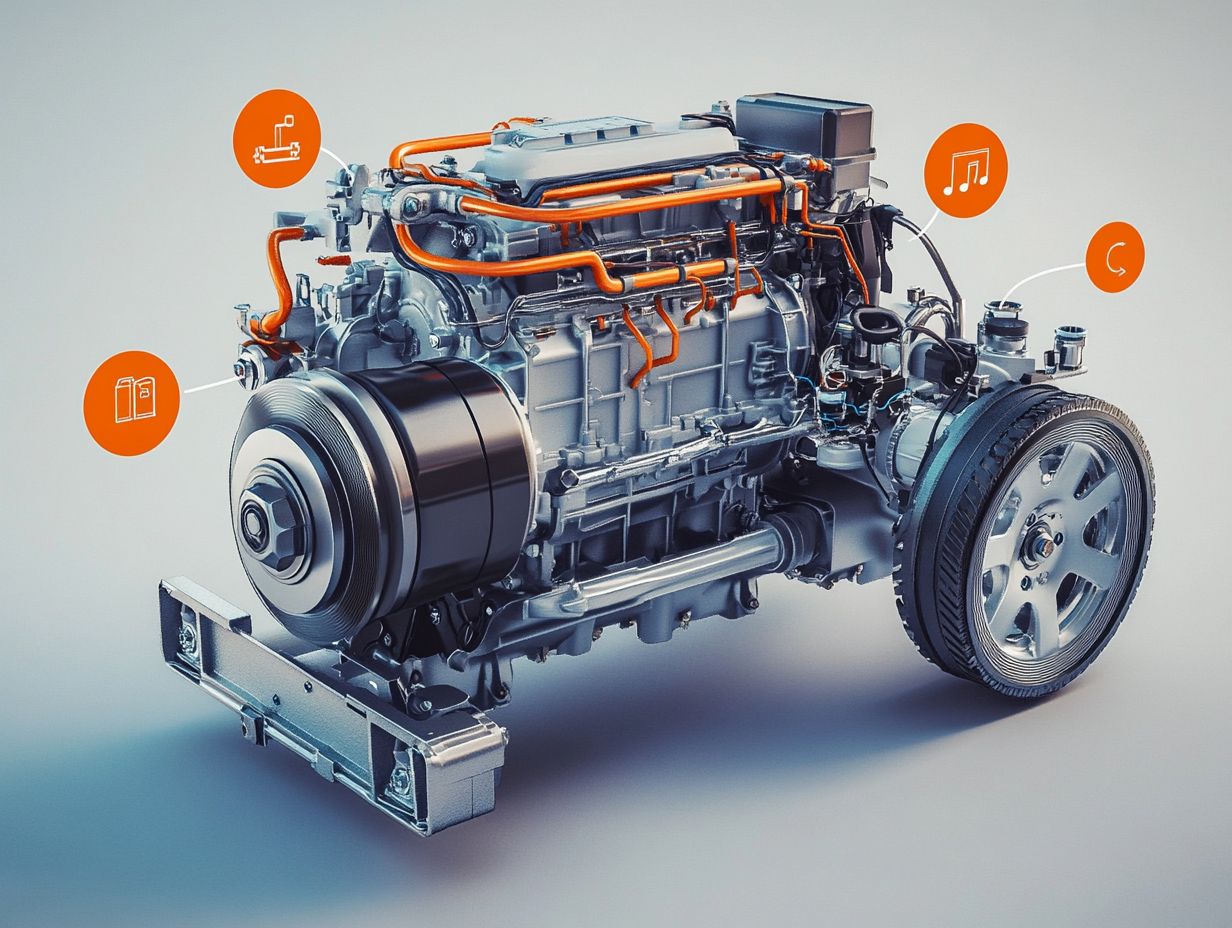
What are the main differences between gasoline and electric engines?
The main difference between gasoline and electric engines is the source of energy used. Gasoline engines use gasoline as fuel, while electric engines use electricity stored in batteries.
Which type of engine is more efficient?
Electric engines usually work better than gasoline ones! This is because they convert a higher percentage of the energy stored in the batteries into power, while gasoline engines waste a significant amount of energy as heat. For those considering different types of vehicles, a feature analysis of manual vs. automatic transmissions can also provide valuable insights.
What are the environmental impacts of using gasoline vs. electric engines?
Gasoline engines emit harmful pollutants like carbon monoxide, nitrogen oxides, and particulate matter, contributing to air pollution and climate change. Electric engines, on the other hand, produce no emissions at the point of use, making them more environmentally friendly.
Which type of engine is more cost-effective?
In the short term, gasoline engines may seem more cost-effective due to their lower upfront cost. However, electric engines can be more cost-effective in the long run because of lower fuel and maintenance costs and potential government incentives for switching to electric vehicles.
What are the main features of gasoline engines?
Gasoline engines are known for their high horsepower and acceleration capabilities. They also have a longer driving range compared to electric engines and can be refueled quickly at gas stations. For those considering alternatives, a detailed feature breakdown of hybrid vs. electric vehicles can provide valuable insights.
What are the main features of electric engines?
Electric engines are known for their quiet operation and instant torque. This provides smooth acceleration that enhances the driving experience.
Regenerative braking helps recharge the batteries while driving. This feature boosts the vehicle’s efficiency and makes every drive more effective.


